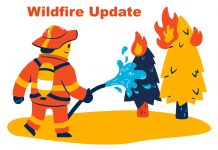Edmonton – Wildfire Update – Firefighting operations in central parts of the province have benefited from recent moisture and cooler temperatures, but conditions are expected to get hotter and drier ahead of the weekend.
Those evacuated due to wildfires should register at local reception centres or at emergencyregistration.alberta.ca.
Current situation
- Alberta has declared a provincial state of emergency. Visit alberta.ca/emergency for information or call 310-4455, now available 24-7.
New information
- Re-entry operations for Evansburg took place at 8 a.m. today. Evacuation orders remain in place for the areas of Lobstick Resort, Hansonville and areas south of Highway 16 from Range Road 81 to Reno Road and Highway 16A to Range Road 75 in Yellowhead County.
- Re-entry operations for parts of Lac Ste. Anne County took place at 2 p.m. today. Evacuation orders remain in place elsewhere in Lac Ste. Anne County.
- The High Prairie Community Health and Wellness Clinic re-opened today at 8:30 a.m. Any pre-booked appointments at the clinic will continue as planned. Walk-in services resumed with registration beginning at 12:30 p.m. on a first-come, first-served basis.
Wildfire activity updates
- The fire danger remains extreme in many northern areas of the province, which means there could be extreme wildfire behaviour. Despite cooler temperatures elsewhere, a wildfire can still start easily and spread quickly in these conditions.
- There are 77 active wildfires in the Forest Protection Area.
- 23 are classified as out of control
- 17 are being held and are not expected to grow beyond projected boundaries given current weather conditions and resources
- 36 are under control
- Given the fluid circumstances, the above numbers are subject to change. Up-to-date information on all wildfires is on the Alberta Wildfire dashboard and the Alberta Wildfire app.
Firefighting resources
- More than 80 wildland firefighters are arriving today from Quebec, Ontario and New Brunswick.
- Alberta currently has more than 700 wildland firefighters, heavy equipment and airtankers responding to wildfires in the province.
- So far, Alberta has received help from counterpart wildfire agencies in British Columbia, Quebec and Ontario. Alberta has requested additional resources through the Canadian Interagency Forest Fire Centre in Winnipeg.
Evacuations
- Evacuation orders: 13
- Evacuation alerts: 15
- There are currently 19 declared states of local emergency (SOLE) and four band council resolutions in effect.
- An up-to-date list of all communities under evacuation order, notice or alert can be found at alberta.ca/emergency.
- As of May 10, Alberta has recorded approximately 17,386 evacuees, with 13,829 evacuees confirmed as having registered at designated evacuation centres.
- Residents in affected areas should follow local media, local municipalities and Alberta Emergency Alerts for updates and advisories.
Information for evacuees
- Evacuees should register at the reception centre identified for their community so staff can quickly assist them and connect them with the resources they need.
- Evacuees with special needs who are unable to stay in an evacuation centre can request emergency financial assistance to cover hotel accommodations.
- Special needs could include having a disability, a medical condition or other family needs.
- Apply for emergency financial assistance by visiting an Alberta Supports Centre or calling the Income Support Contact Centre at 1-866-644-5135. Information is also available through the Alberta Supports Contact Centre at 1-877-644-9992.
- Any Albertan who has evacuated under mandatory order for seven days or more can apply for a one-time emergency evacuation payment at alberta.ca/emergency using an Alberta.ca Account.
- Eligible evacuees will receive $1,250 per adult and an additional $500 per dependent child under 18 years.
- Payments will be made by e-transfer within 24 hours of application, which is the fastest and most efficient way to receive these payments. Alternate payment arrangements may take longer.
- Evacuees unable to receive an e-transfer or who cannot apply online can contact 310-4455 for assistance and to make alternate arrangements.
- Applications will be open for 30 days after a specific community’s evacuation order ends; however, eligible evacuees are encouraged to apply as soon as possible.
- Albertans affected by wildfires, including evacuees, can access supports by calling the Alberta Supports Contact Centre at 1-877-644-9992.
- The centre is open from 8:15 a.m. to 8 p.m. on weekdays and from 9 a.m. to 3 p.m. on weekends.
- The Income Support Contact Centre is also available 24-7 and provides emergency financial assistance. Call 1-866-644-5135.
- Albertans can report a price gouging complaint by calling 310-4455.
Fire bans and other restrictions
- Unusually warm, dry weather and strong winds mean it is easier for a wildfire to start and spread.
- As a result of these conditions, there is a fire ban issued for most of the province. Fire restrictions in some parks and southern municipalities are also in effect. No open burning is allowed, including backyard fire pits, inside the Forest Protection Area. Alberta Parks and many municipalities and communities have ordered their own bans and restrictions. For more information, visit albertafirebans.ca.
- A provincial off-highway vehicle (OHV) restriction is also in place, which means the recreational use of off-highway vehicles on public land, including on designated OHV trails, is prohibited.
Travel
- Visit 511.alberta.ca for up-to-date information on road closures and travel advisories.
Health
- The High Prairie Health Complex emergency department reopened on May 8.
- The Edson Healthcare Centre emergency department reopened on May 9.
- The remainder of the above-two facilities remain closed. It is not yet known when additional services at either facility will resume.
- Fully evacuated acute care facilities include:
- Fox Creek: All patients were evacuated and moved to alternate sites on May 6.
- Drayton Valley Hospital and Care Centre: All patients were safely evacuated on May 5.
- Other evacuated health facilities:
- JB Wood Continuing Care Centre: Evacuation of all residents was completed on May 6.
- East Prairie Community Health Services closed on May 6.
- Rainbow Lake Community Health Centre closed on May 6.
- Evansburg Health Centre/Good Samaritan Pembina Village closed on April 30.
- Evacuated patients and continuing care residents continue to be cared for in safe and appropriate settings. All zones continue to accommodate those in need.
- All patients who are expected for assessment or treatment for a cancer diagnosis in an evacuated area are asked to call the Cancer Centre Transition Team (toll-free at 1-888-432-8865) to ensure they are receiving the care they require.
- All appointments with laboratory services, mental health and public health in evacuated communities continue to be postponed. Clients will be contacted directly by AHS to be rescheduled as soon as possible. Dialysis clients are being booked at alternate sites. Home care clients impacted by evacuations are being contacted to arrange for alternative home visits and support from nursing teams.
- Alberta Health Services has issued a boil water advisory for the River Bend Water Co-op in Big Lakes County as a precautionary measure.
- The advisory is in place for any remaining water within the water system, and for when water service is restored following wildfire evacuation. Instructions are available on the Alberta Health Services Coping with Emergencies website.
- EMS and zones continue to be fully engaged to ensure the safe transport and care of all patients/residents. Other zones and provincial programs are assisting with reception centres and ensuring availability of spaces/equipment as needed.
- Residents affected by the wildfires who have health care-related questions and are looking for up-to-date information about the wildfires or health care resources, should visit the Alberta Health Services Wildfire Resources webpage.
- For non-emergency health advice, including information on their health care options, residents should call Health Link at 811.
Prescription medications for evacuated Albertans
- Pharmacies across Alberta are ready to assist evacuated Albertans who do not have their required medication or don’t have enough medication. Please go to the nearest pharmacy and explain your situation. The pharmacist will assess your health care needs and consult with your regular pharmacist and health care provider, when possible, to confirm your prescription.
Medical equipment and supplies for evacuated Albertans
- Albertans using the Alberta Aids to Daily Living (AADL) program who may not have their required medical equipment and supplies can obtain a replacement. Clients who have lost their identification can contact an AADL authorizer or vendor with their name, address, date of birth, personal health number or any other information they can provide along with a description of what AADL-approved medical equipment and/or supplies were lost or damaged.
Mental health resources
- If you’re struggling with your mental health or need to talk to someone about how you are feeling, resources are available:
- Call the AHS Mental Health Helpline at 1-877-303-2642 or Health Link at 811.
- Call 211 or text INFO to 211 or visit ab.211.ca to access digital supports or find local services near you.
- Call Counselling Alberta at 1-833-827-4230 or visit counsellingalberta.com for virtual counselling services.
Air quality concerns
- People who are concerned about air quality impacts on their health should refer to the Air Quality Health Index. The Air Quality Health Index is updated hourly.
- Alberta Health Services is deploying mobile air quality monitoring, as multiple communities are reporting high levels of smoke and ash residue.
Justice
- Alberta Courts are relocating sittings in communities affected by wildfires to other locations or online. For the latest updates and schedules visit:?
Agriculture and livestock
- Agricultural societies may have room for livestock evacuated from wildfire areas. Contact the Alberta Association of Agricultural Societies.
- Evacuated farmers and ranchers:
- Should visit alberta.ca/emergency to find the most up-to-date information on the current wildfire situation.
- Can contact the wildfire resource line at 310-4455 with agriculture and livestock-related questions.
- Should register at the reception centre identified for their community so staff can quickly assist them and connect them with the resources they need.
- May need re-entry permits if they want to go back into an evacuated area to check on livestock and should check with their municipality before entering.
Alberta Emergency Alerts
- For up-to-the-minute Alberta Emergency Alert information, visit Alberta Emergency Alert.
- Albertans are encouraged to download the Alberta Emergency Alert mobile app, which immediately pushes all alerts out to subscribers.
- Albertans may notice emergency alerts for their community expiring or being removed from the system. This does not mean the emergency is over. What it does mean is that your community has been able to return to normal communication methods to update residents via local media.
- Please pay close attention to alert updates, local media and the alberta.ca/emergency website for up-to-date information on evacuation orders, reception centres and resources for people who have been impacted.
Donations
- Albertans who wish to help can make cash donations through the Canadian Red Cross or within their regions to a recognized charitable organization of their choice.
- Financial donations are preferred for disaster events, as most critical items can be sourced locally and monetary donations can be used to support vulnerable populations and be targeted to mental health initiatives in support of evacuees.
- Individuals and companies with goods or services to offer or donate to support government’s response to the wildfire event can email EmergencySupportOffers@gov.ab.ca.
Insurance
- Albertans with questions about their insurance coverage during the wildfires should contact their insurance representative.
- The Insurance Bureau of Canada (IBC) has updated information about insurance during wildfires. Albertans affected by wildfires can visit the IBC web page for information on property and auto insurance.
- Albertans can call IBCs Consumer Information Centre at 1-844-2ask-IBC (1-844-227-5422) or email IBC’s regional office at AskIBCWest@ibc.ca (Western and Pacific regions).





